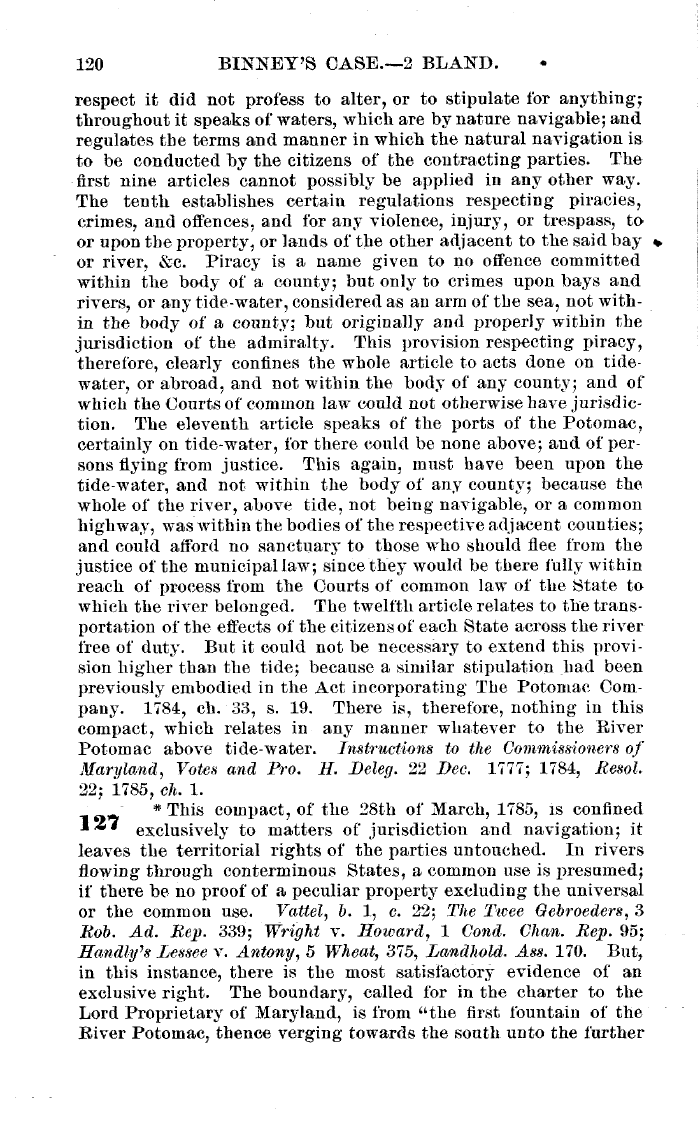|
BINNEY'S CASE.-2 BLAND.
respect it did not profess to alter, or to stipulate for anything;
throughout it speaks of waters, which are by nature navigable; and
regulates the terms and manner in which the natural navigation is
to be conducted by the citizens of the contracting parties. The
first nine articles cannot possibly be applied is any other way.
The tenth establishes certain regulations respecting piracies,
crimes, and offences, and for any violence, injury, or trespass, to
or upon the property, or lands of the other adjacent to the said bay
or river, &c. Piracy is a name given to no offence committed
within the body of a county; but only to crimes upon bays and
rivers, or any tide-water, considered as an arm of the sea, not with-
in the body of a county; but originally and properly within the
jurisdiction of the admiralty. This provision respecting piracy,
therefore, clearly confines the whole article to acts done on tide-
water, or abroad, and not within the body of any county; and of
which the Courts of common law could not otherwise have jurisdic-
tion. The eleventh article speaks of the ports of the Potomac,
certainly on tide-water, for there could be none above; and of per-
sons flying from justice. This again, must lave been upon the
tide-water, and not within the body of any county; because the
whole of the river, above tide, not being navigable, or a common
highway, was within the bodies of the respective adjacent counties;
and could afford no sanctuary to those who should flee from the
,justice of the municipal law; since they would be there fully within
reach of process from the Courts of common law of the State to
which the river belonged. The twelfth article relates to the trans-
portation of the effects of the citizens of each State across the river
free of duty. But it could not be necessary to extend this provi-
sion higher than the tide; because a similar stipulation had been
previously embodied in the Act incorporating The Potomac Com-
pany. 1784, ch. 33, s. 19. There is, therefore, nothing in this
compact, which relates in any manner whatever to the River
Potomac above tide-water. Instructions to the Connnissioners of
Alaryland, Votes and Pro. H. Deleg. 22 Dec. 17 7 7; 1784, Resol.
22; 17 85, ch. 1.
2,',- * This compact, of the 28th of March, 1785, is confined
exclusively to matters of ,jurisdiction and navigation; it
leaves the territorial rights of the parties untouched. In rivers
flowing through conterminous States, a common use is presumed;
if there be no proof of a peculiar property excluding the universal
or the common use. Mattel, b. 1, c. 22; The Twee Gebroeders, 3
Rob. Ad. Rep. 339; Wright v . Howard, 1 Cond. Chan. Rep. 95;
Handl-y's Lessee v. Antony, 5 Wheat, 375, Landhold. Ass. 17©. But,
in this instance, there is the most satisfactory evidence of an
exclusive right. The boundary, called for in the charter to the
Lord Proprietary of Maryland, is from "the first fountain of the
River Potomac, thence verging towards the south unto the further
|

